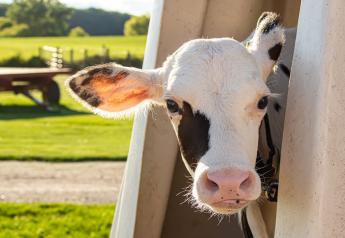Big Cow on Campus

 |
"The kids come out of the assembly with a new understanding of cows and milk," says Mobile Dairy Classroom instructor Mishael Tarbell, here at a Bakersfield, Calif., school. |
Mobile dairy classroom educates California kids about milk and cows.
She's a typical three-year-old Holstein named Milky Way, with a four-compartment stomach, no upper front teeth and a 1,300-lb. body that produces 10 gal. of milk a day.
Those are eye-opening facts for the 200 kindergarten through second-grade students sitting cross-legged on the blacktop at Patriot Elementary School in Bakersfield, Calif.
Most of these students have never seen or touched a real cow, even though they live in the nation's No. 1 dairy state. But the Dairy Council of California is working to change that. Through its Mobile Dairy Classroom program, it's bringing kids and cows face to face on school campuses. Using six mobile units, the program reaches 620 California schools and 400,000 students a year.
"It's important for kids to know that milk comes from an actual animal, not the grocery store," says Mishael Tarbell, the council instructor who shared Milky Way's secrets at Patriot Elementary's morning assembly.
It normally takes Tarbell 35 minutes to explain what stalls and stanchions are and where to find Milky Way's hip and shoulder bones, ribs and udder. She explains that Milky Way lives on a Bakersfield dairy and consumes 50 lb. of feed and 30 gal. of water every day.
The Mobile Dairy Classroom program gives kids more than a chance to sit outside. It's geared to meet state education standards for science and social studies as well as school wellness policies. Primary-grade students learn new vocabulary, life cycles and anatomy concepts and follow milk from cow to container. Fourth- through sixth-graders learn about the ruminant digestive system, lactation cycle, agriculture technology and milk's processing phase.
"The program is fantastic," says Tarrah Greer, a first-grade teacher at Patriot Elementary. "We use the teaching materials from Dairy Council of California, and we've been talking about dairy products and services. Today's presenter hit on all the things I was hoping for."
Funded equally by California dairy producers and processors, the program is free to schools. That's a big plus for Patriot Elementary principal Diane Dalton-Rivard. "That there's no cost is incredible," she says. "That means a lot in these economic times.
"The kids loved the presentation," Dalton-Rivard adds. "There's never anything better than having the real McCoy. It cements memories so much more than just talking about it."
The Dairy Council of California, which turned 90 this past year, offers a variety of free nutrition education programs for students, teachers, adults and health professionals.
"Since the beginning, Dairy Council of California has focused its financial resources toward education," says CEO Peggy Biltz. "We not only teach individuals that milk and milk products are the cornerstone of a healthy diet, but we also provide them with the guidance and tools they need to incorporate what they learn into their everyday diet."
Bonus content:
Dairy Council online materials







